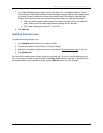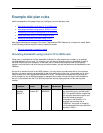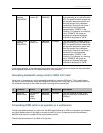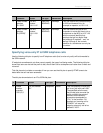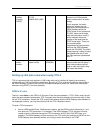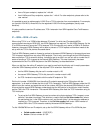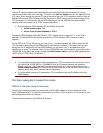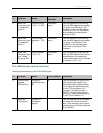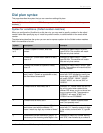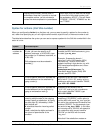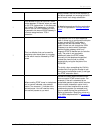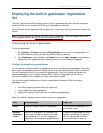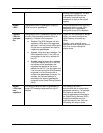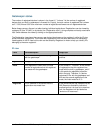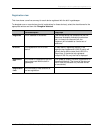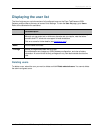
Dial plan syntax
Cisco TelePresence ISDN Gateway 2.1 Online help (Printable format) 41 of 135
Dial plan syntax
This page describes the syntax that you can use when adding dial plans.
Note: All IPv6 address fields in the ISDN Gateway require the IPv6 address to be enclosed in square
brackets [ ].
Syntax for conditions (Called number matches)
When you configure the Condition for a dial plan rule, you may want to specify a pattern for the called
number rather than specifying any of: match any called number, no called number or the exact called
number.
The table below describes the syntax you can use to express a pattern for the Called number matches
field in the condition of a rule:
Syntax
Description
Example
Numbers 0
to 9
To match a specific number, enter that
number.
Example: to match calls to "001234",
type 001234. The condition will match
that and only that number.
S To match an * (known as an asterisk or star),
enter an S.
Example: to match calls to "**1234",
type SS1234. The condition will match
that and only that number.
P
To match a # (known as a pound or hash),
enter a P.
Example: to match calls to "#1234", type
P1234. The condition will match that and
only that number.
D To match any digit, # (known as a pound or
hash), and/or * (known as an asterisk or star)
use the wildcard character D
Example: to match any number that
starts with "623" followed by exactly two
more digits, type 623DD. This condition
will match "62300", "62323", "62355",
"62399" "623*#", etc. but not "623" or
"623233".
?
To match once or zero times, use ?
Example: "6?" means match one 6 or no
6s, and is useful when used with the
wildcard "D" where you do not know how
long a number will be. The expression:
"67800D?" will match "67800" and
"678004" but not "67800666".
+
To match once or more, use + Example: "5+" means "match at least
one 5, but possibly more".
*
To match zero or more times, use *. This is
useful when used with the wildcard: "D*"
means "match any digit, any number of times".
Example: to match any number that
starts with "01", has any amount of digits
in the middle, and ends with "5", type 01
D* 5.
() Parentheses indicate substitution groups. To
include any of the incoming called digits in the
Example: to match any number starting
with "678", then followed by a number of



